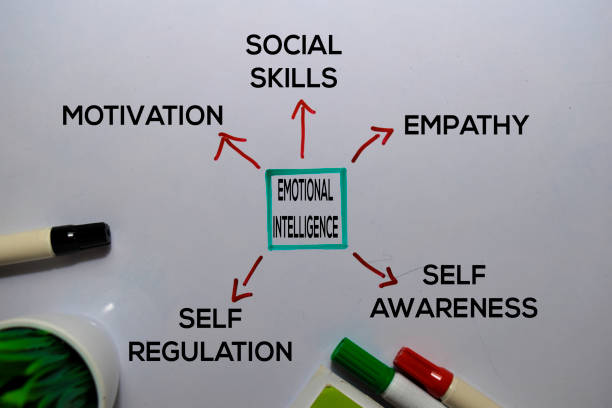The Power of Emotional Intelligence in Leadership

Your journey to leadership isn't just about technical skills. There's a secret ingredient that can take you to new heights—a game-changer called emotional intelligence. It's the key to managing stakeholders and coaching teams, conquering stress, delivering effective feedback, and collaborating like a true leader. A professional coaching platform like ours at CoachBase can help you build EQ and harness success in your career.
Emotional intelligence, or EQ, makes up a whopping 90% of what sets top performers apart from their peers with similar technical know-how.
So, what exactly is it?

Defining Emotional Intelligence (EQ)
Think of EQ as your superpower—an ability to understand and control your own emotions while influencing the emotions of those around you. Coined by researchers John Mayer and Peter Salovey in 1990, emotional intelligence was later popularized by psychologist Daniel Goleman.
Goleman revealed the pivotal role of emotional intelligence in leadership, stating, "The most effective leaders are all alike in one crucial way: They all have a high degree of what has come to be known as emotional intelligence. It’s not that IQ and technical skills are irrelevant. They do matter, but...they are the entry-level requirements for executive positions."
Emotional intelligence has become an essential skill, backed by research from EQ provider TalentSmart, which shows that it's the strongest predictor of performance. According to a survey by CareerBuilder, 71% of employers agreed that they value EQ over IQ. They recognize that employees with high emotional intelligence are the ones who remain calm under pressure, skillfully resolve conflicts, and respond to colleagues with genuine empathy.
So, let's dive into the four core competencies trusted and followed by our digital coaching platform - CoachBase that make up emotional intelligence.
Goleman’s EI Framework: Four Components of Emotional Intelligence
1-SELF-AWARENESS
Self-awareness is the foundation of it all. It's not just about recognizing your strengths and weaknesses but understanding your emotions and their impact on your team's success.
Here's an eye-opener: Research by organizational psychologist Tasha Eurich reveals that while 95% of people believe they're self-aware, only a mere 10 to 15% truly are. A lack of self-awareness can hinder your team's progress, leading to stress and demotivation.
To bring out the best in others, you must first tap into your potential. A fantastic way to assess your self-awareness is through a 360-degree feedback process. It involves evaluating your performance and comparing it to the perspectives of your boss, peers, and direct reports. Find a coach online to get on this journey of self-discovery and provide valuable insights into your behavior and how you're perceived within the organization.
2- SELF-MANAGEMENT
Self-management is the art of controlling your emotions, especially in stressful situations and maintaining a positive outlook in the face of setbacks. Leaders who struggle with self-management often find themselves reacting impulsively, unable to rein in their emotions.
But here's the game-changer: emotional intelligence empowers you to transition from reactive to responsive. Take a moment to pause, breathe deeply, and gather yourself. Employ strategies like taking a walk or seeking support from a trusted friend to manage your emotions effectively. This way, you can respond to stress and adversity with intention and grace.
3- SOCIAL AWARENESS
Emotional intelligence isn't just about understanding your own emotions—it's also about perceiving the emotions and dynamics within your organization. Social awareness is the ability to empathize with others, enabling effective communication and collaboration with your peers.
True leaders excel in social awareness. They make a genuine effort to understand their colleagues' feelings and perspectives, fostering fruitful interactions. Global leadership development firm DDI ranks empathy as the number one leadership skill, revealing that empathetic leaders outperform others by over 40 percent in coaching, engaging others, and decision-making. Furthermore, a study by the Center for Creative Leadership found that managers who show empathy toward their direct reports are perceived as high performers by their superiors.
By communicating with empathy, you create a supportive environment for your team while enhancing your performance as a leader.
4- RELATIONSHIP MANAGEMENT
Relationship management is about influencing, coaching, mentoring, and effectively resolving conflicts. Some might shy away from conflict, but addressing issues head-on is crucial. Unresolved conflicts waste valuable time, with each one potentially consuming eight hours of productivity through gossip and unproductive activities, draining resources and morale.
Find an online coach to not only build a happy and engaged team but foster a positive relationship with stakeholders so you must embrace those tough conversations. A survey by the Society for Human Resource Management revealed that 72% of employees ranked "respectful treatment of all employees at all levels" as the top factor contributing to job satisfaction.

THE CRUCIAL IMPACT OF EMOTIONAL INTELLIGENCE
Leaders set the tone for their organization. When emotional intelligence is lacking, the consequences can be far-reaching, resulting in decreased employee engagement and higher turnover rates. Not only this, it also has detrimental effects on the stakeholders since they might feel not understood or heard. While your technical skills may be exceptional, without effective communication and harmonious collaboration, those skills may go unnoticed.
Mastering emotional intelligence is the key to propelling your career and driving organizational success. Find a coach online who will help you develop your emotional intelligence and enable you to develop others’ EQ too!
